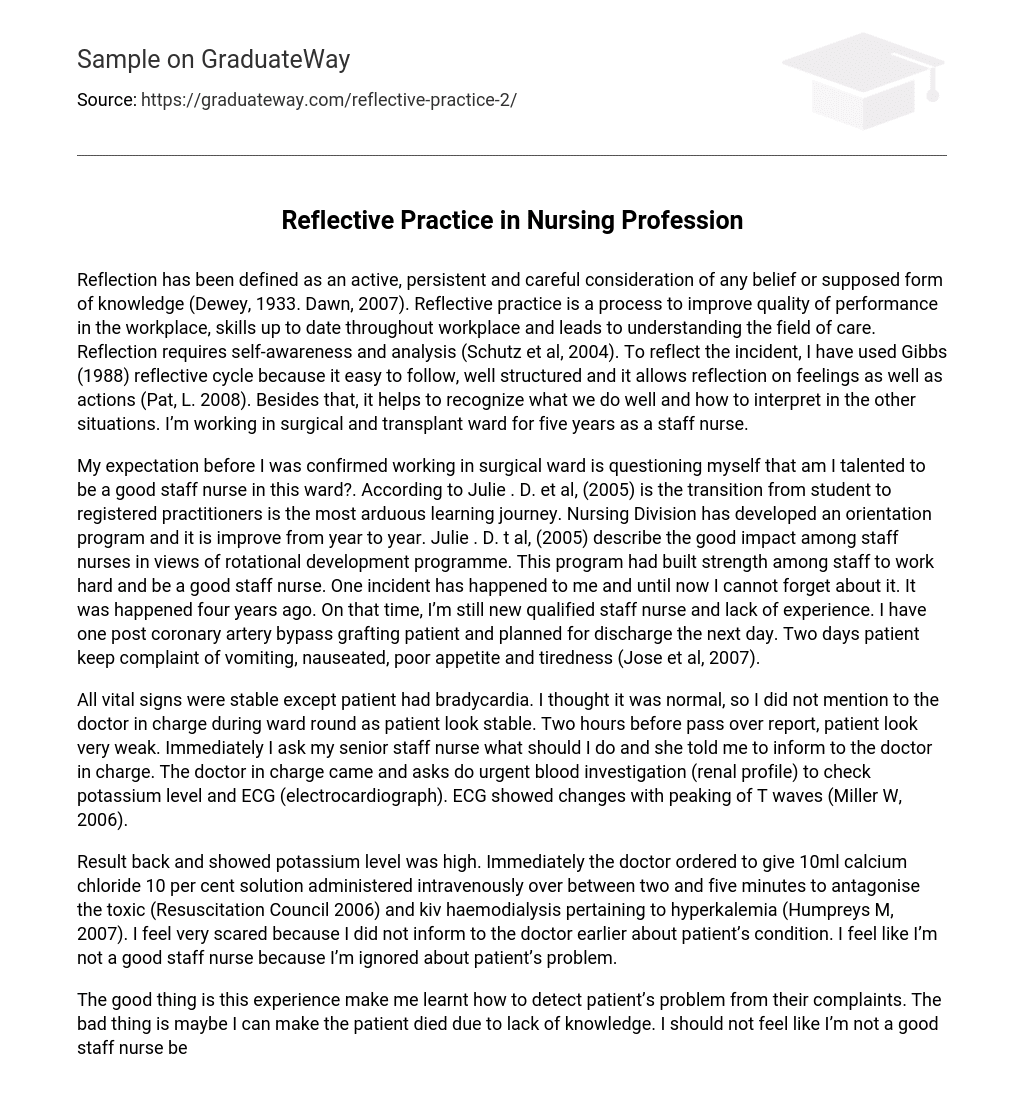Reflection involves actively and carefully considering any belief or supposed form of knowledge (Dewey, 1933. Dawn, 2007). Reflective practice aims to improve performance in the workplace, keep skills up to date, and enhance understanding in the field of care. It requires self-awareness and analysis (Schutz et al, 2004).
To reflect on a specific incident, the chosen reflective cycle is Gibbs’ (1988) because it is easy to follow, well structured, and allows for reflection on both feelings and actions (Pat, L. 2008). Additionally, it helps identify areas of strength and guides interpretation in other situations.
The job position held for five years has been as a staff nurse in a surgical and transplant ward.
When I first started working in the surgical ward, I had doubts about my skills as a staff nurse. Transitioning from student to registered practitioner is challenging (Julie . D. et al 2005). The Nursing Division has improved its orientation program over time. According to Julie . D. et al (2005), a rotational development program helps staff nurses develop resilience and dedication. One incident that stands out was when I was a newly qualified staff nurse with limited experience four years ago. A patient who had undergone coronary artery bypass grafting experienced vomiting, nausea, loss of appetite, and fatigue for two days before discharge (Jose et al 2007).
During the ward round, I observed that all vital signs were stable except for the patient’s bradycardia. However, I did not consider it abnormal and therefore did not mention it to the attending doctor. At that time, the patient appeared to be in a stable condition.
Shortly before giving the pass over report two hours later, the patient suddenly exhibited significant weakness. I promptly sought guidance from my senior staff nurse regarding appropriate actions to take. She advised me to inform the attending doctor.
Upon arrival of the doctor, urgent blood investigations were ordered, specifically a renal profile to assess potassium levels, along with an electrocardiograph (ECG). The ECG indicated changes marked by T wave peaking (Miller W, 2006).
Upon receiving the results, it was discovered that the potassium level was elevated. As a result, the doctor promptly prescribed the administration of 10ml of a 10% calcium chloride solution intravenously over a span of two to five minutes. This action aimed to counteract the toxic effects associated with hyperkalemia (Resuscitation Council, 2006) and to address the need for haemodialysis (Humphreys M, 2007). I am currently experiencing extreme fear because I failed to inform the doctor earlier about the patient’s condition. Consequently, I am questioning my abilities as a staff nurse since I neglected to address an important problem affecting the patient.
The positive aspect of this experience is that it has taught me how to identify a patient’s problem based on their complaints. However, the negative aspect is that my limited knowledge could potentially lead to the patient’s demise. It is crucial for me not to feel inadequate as a competent staff nurse because this is a novel experience for me. To prevent further deterioration in the patient’s condition, I can seek guidance from senior staff members regarding how to address the patient’s concerns. If the issue recurs, I should assess the patient’s vital signs, conduct an ECG, and review prior blood investigation results before promptly notifying the doctor.
The significance of being knowledgeable and knowing how to train new staff was highlighted by this incident. Through the use of the Gibb’s reflective cycle, it was learned that knowledge and effective communication are important (Lisa, R., Sally, JB. 2007). The goal is to become a mentor after working in this ward for five years. Being a mentor entails providing high-quality and evidence-based care, as well as supporting student learning and the assessment process (Wilkes. Z. 2006). Mentors serve as positive career role models, offer professional growth opportunities, provide advice and challenges, grant access to learning resources, and offer encouragement and feedback on a mentee’s career progress according to Sara J. et al (2007). To effectively fulfill the responsibilities of the role of a mentor, it is essential to be well-prepared in order to coach and challenge effectively (Wendy et al 2007). According to the Nursing and Midwifery Council (2006), a mentor is defined as a registrant who has met stage two outcomes and facilitates learning, supervises students in practice settings while also assessing them (Wendy et al 2007).
Despite having a mentor-student relationship, mentors must maintain professionalism and impartiality towards all students. Mentors require skills in effective communication and interpersonal interactions to support, facilitate, and evaluate student performance (Wendy et al, 2007). In order to become a mentor, I have decided to enroll in the Diploma in Cardiovascular and Thoracic Sciences course. By participating in this course, I aim to enhance and develop my skills in various aspects.
According to Bennett (2003) and Ali PA, Panther W (2008), in order to establish a strong mentor-student relationship, it is essential to arrange a meeting, introduce the students to the clinical area, create a supportive learning environment, and provide appropriate support. These strategies enable the mentor to understand the students’ personality, clinical experiences, and learning requirements. This knowledge assists the mentor in devising an effective approach to facilitate the students’ learning (Wallace 2003, Ali PA et al 2008).
Being a mentor comes with challenges and a great deal of commitment. These challenges encompass the need to balance patient care and student teaching, cope with a high workload (Bennett, 2003), foster collaboration between students, teachers, and mentors, as well as understand learning theories and assessment methods (Ali PA, Panther W, 2008). Despite facing numerous challenges, mentors cannot afford to give up; instead, they must take on the responsibility of managing and staying updated through relevant in-service training. Pursuing higher education will ensure mentors are equipped with current knowledge (Wilkes 2006).





